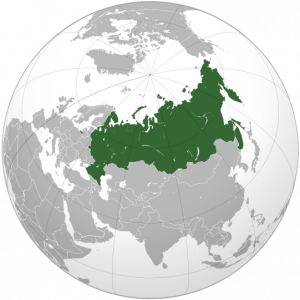POLS/RUSS 4362: RUSSIA TODAY
An Introduction to Russian and Eurasian Studies
Spring 2014, 103 Pickard Hall
Spring 2014, 103 Pickard Hall
Добро пожаловать! Ласкаво просимо! Laipni lūdzam! კეთილი იყოს თქვენი მობრძანება! and Xush kelibsiz!
Welcome! to the core course in UTA’s Russian/Eurasian studies program. This is also one of UTA’s few, truly multi-disciplinary courses. It covers more things about Russia and the lands that used to be part of the former Soviet Union – Eurasia – than you could have expected prior to taking it. Here we will consider the land, history, peoples, and cultures that make up this unique part of the world. This is a survey class designed to stimulate your inner-Russian (or Ukrainian, Uzbek, Georgian, or Latvian) by studying key elements of art, politics, film, geography, and naturally the people. It won’t present all the answers, but instead help us to approach more effectively the many questions we have about these lands, peoples, or cultures.
This is also about what many term a “critical” area of study. Russia is a country, language, and culture of global importance, and understanding it requires specialized, multi-disciplined instruction. A core group of three regular instructors, as well as numerous guest lecturers will give you a unique understanding of the meanings of modern-day Russia. Our “learning objectives” include a broad understanding of the primary means to analyze a part of the world whose significance extends from world politics and trade, to literature, philosophical interpretation, and scientific endeavor. You will learn of tsars, commissars, composers, every-day people, climates, economics, and a host of other subjects that you would normally need three semesters or more to cover. You will learn in here of scientific endeavors, analytical techniques, and how opinion about the world’s largest country fits into the mosaic of global study. Here is a great opportunity to discover that Russia is more than a country, much more than either the sum of its parts or the parts of its sum. Russia is here revealed for all its contradictions, predispositions, and curiosities which make for one of the most interesting area studies to be found in the college experience.
Russia and Eurasia are just too big effectively handled by any one professor. So we have combined the expertise of three UTA instructors: Dr. Mark Cichock (Political Science); Dr. Lonny Harrison (Modern Languages); and Dr. Pete Smith (Russian/Distance Education). As your teachers we will guide you along paths unexpected, unexplored, or maybe already familiar to some of you. In addition, we will introduce you to professionals from the field of Russian studies by means of in-class video conferences with U.S. government agencies, business sector specialists, and commentators from within Russia itself. We expect that your reward for participation will be an experience that you will remember long after graduating from UTA.
Readings: There is no specific text for this course due to the very broad subject matter. The class relies very heavily on the use of blogs including one that we provide for the class (http://websites.uta.edu/russiatoday/). There are some excellent sources of information and blogs, especially that we will be telling you about daily. All exams will include current events items and analytical themes found in these sources, as well as materials posted to Blackboard.
All students are required to read the following blogs on a daily basis:
http://www.rferl.org/archive/The_Power_Vertical/latest/
http://www.robertamsterdam.com
Maps: Students are directed to the Maps Collection website of the University of Texas at Austin. The site is http://www.lib.utexas.edu/maps/index.html.
Testing/Evaluation: There are three exams for this course, or what we refer to as Opportunities to Excel (OTE’s); this includes the final exam. OTEs combine short answer essays, identifications, fill in the blanks, and multiple-choice questions. In addition, all students will do a research or translation assignment (see below). Each counts as 25% of your total grade and all must be taken/completed to receive a final grade for the course. Students are responsible for being on time for exams and in handing in their assignments on time. Make-up exams are only possible with the consent of the individual instructor and must conform to university policy for testing. POLS research projects are due on April 25.
Students are responsible for contacting their respective professors for the details of their assignments. Russian language students will do a research paper using Russian sources assigned by Dr. Harrison; while POLS students will also do research papers. Subjects for papers are decided individually with Drs. Cichock and Harrison. Each professor determines his own standards for quantity, quality, and grading of assignments, and all three instructors contribute to the writing of the exams.
Students are encouraged to use the links to websites provided on Dr. Cichock’s webpage [http://wweb.uta.edu/faculty/cichock/Links/contents.htm].
Attendance: This course relies heavily on guest speakers so class attendance is required. Students are expected to show up on time so that speakers may get on with their material/discussions and not be interrupted by late arrivals. Attendance is taken into consideration in terms of borderline grades.
Academic Honesty: Students are expected to familiarize themselves with UTA’s standards for academic honesty and integrity. Information on academic honesty/dishonesty is available from the Office of Student Affairs.
Accommodations: UTA provides accommodations for most academic circumstances whether these are disabilities, tutoring, or illnesses. In all cases, students are responsible for providing the necessary paperwork and must speak to the professors about their needs. All personal accommodations, as well as grades, are kept in the strictest confidence so that students may feel free to pursue their studies without interference or invasions of privacy. There are no make-up exams
Office Hours/Access to Instructors:
Dr. Cichock: Office, 221 Hammond Hall; Office hours: MWF 10am-10:50am, and by appointment.
Phone: 817-272-2388.
E-mail: cichock@uta.edu.
Dr. Harrison: Office, 221 Hammond Hall; Office hours: MWF 2:00-3:00pm, and by appointment;
Phone: 817-272-9506.
E–mail: lonnyharrison@uta.edu.
Dr. Smith: Office, 300 Nedderman Hall; Office hours: MWF, 11am-12pm, and by appointment.
Phone: 817-272-5727.
E-mail: psmith@uta.edu.

Calendar
(please note that scheduling may change due to the availability of speakers)
Unit One: Defining Russia and Eurasia
Jan. 13: Introduction Cichock, Harrison, and Smith
Jan. 15, 17, & 20: Geography (physical, pol., and eco.) Cichock and Smith
Pre-course survey, including map quiz (check for on Blackboard)
Jan. 22: Language and Diversity Smith and Harrison
Learning tools for the Cyrillic alphabet on Blackboard:
http://www.russianlessons.net/
http://masterrussian.com/blday_greeting.shtml
Jan. 24: Demographic Issues Smith
Jan. 27, 29, 31, & Feb. 3: History Smith, Harrison, and Cichock
Feb. 5 & 7: Ideology (Marxism, capitalism, Cichock
authoritarianism)
Feb. 10: Russian Philosophy Dr. Kenneth Williford, UTA Philosophy Dept.
Feb. 12: OTE #1
Unit Two: The Contexts of Culture, Politics, and Change
Feb. 14, 17, & 19: Russian and Soviet literature Harrison
Feb. 21 & 24 – “Raspad”: The Breakup of the USSR Smith
Feb. 26, 28, and March 3: Politics in Russia Cichock
March 5 & 7: The Media Smith
March 10-14: Spring Break!!!
March 17 & 19: Modern Ukraine Cichock
March 21: Modern Central Asia Cichock
March 24: The Caucasus Cichock & Smith
March 26: The Baltics Cichock
March 28: OTE #2 (also last day to drop)
Unit Three: Russia from Other Eyes
March 31: Study Abroad Experiences Harrison, Cichock, guest lecturers
April 2 & 4: Teleconferences (Room TBA)
April 7 & 9: Religion in Russia and Eurasia Cichock
April 11: Architecture in Russia guest lecturer TBA
April 14, 16, 18, & 21: Russian Film Harrison
April 23 & 25: Youth Culture in Russia Smith and other guest lecturer
(POLS projects due April 25)
April 28 & 30: Russia’s International Relations Cichock
May 2: Summarizing Russia (course review) Cichock, Harrison, and Smith
May 7: Final OTE, 8-9:15am.


